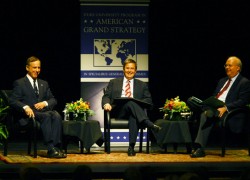
Duke U. got its own foreign policy debate before the nation did Monday night.
In the evening before the final presidential debate, Karl Rove—political analyst and former senior advisor to former President George W. Bush—debated Howard Dean—former governor of Vermont and former Democratic National Committee Chairman—on the effects of the 2012 Presidential Election on America’s role in global politics in a fully packed Page Auditorium.
Rove had originally been slated to debate Robert Gibbs, President Barack Obama’s campaign advisor and former White House Press Secretary, but because Gibbs was unable to attend, Dean replaced him.
Moderating the debate was political science professor Peter Feaver, director of the American Grand Strategy program, which sponsored the event. Feaver joked that, had they not gotten Dean to fill in last minute, he would have had to “pull a Clint Eastwood” and have Rove debate an empty chair.
Unlike the night’s more pugnacious presidential debate, Rove and Dean’s camaraderie and banter caused their debate to resemble a conversation between friends with opposing political viewpoints. When Feaver asked Rove and Dean to introduce each other, for example, both debaters plied one another with backhanded compliments.
During Rove’s introduction, he poked fun about various moments throughout Dean’s political career. Rove described how Dean supported Republican presidential candidate Barry Goldwater in 1964 “and then went downhill from there.” He also joked about a later Democratic Convention in which Dean “drank with Kennedy people but voted with the Carter people.”
Despite these comments, Rove sincerely commended Dean for being a “fervent advocate for the things he believes in” and for his long service as governor of Vermont.
Keeping with the friendly tone of the conversation, Dean praised Rove as the “leading political mind” of the Republican party.
“I know, because I’ve been fighting them for my entire life,” he said. Dean also mocked a recent loss by the University of Texas football team, from Rove’s long-time home state.
“In Vermont, we’re fiscal conservatives, we don’t have a football program,” Dean said.
Following this exchange, Rove whipped out an electric screwdriver, revved it and made a pun about “drilling into the issues.”
The two men then went on to tackle more substantive matters of foreign policy and national politics. They offered nuanced personal positions on issues abroad, each point backed with specific examples and did not always follow their party’s ideologies—they both praised and admonished Obama’s foreign policy record to varying degrees.
One hotly debated issue involved American military involvement abroad. Rove advocated the value of “boots on the ground,” whereas Dean argued that troops should be pulled out of countries such as Iraq and Afghanistan because “the new version of war is different.”
For instance, Dean noted how the current battle against jihadists was fought largely by drones in northwest Pakistan. Rove volleyed back that if the United States did not maintain bases around the world, it would not be able to launch such drone attacks where needed. The two continued to discuss specific policy topics, including relations with China, U.S. interventionism and political divisiveness.
Freshman Tyler Fredricks liked that Rove and Dean talked about topics of foreign policy that are not part of the usual political discussion.
“Usually they focus on Iraq, Iran or the E.U, but they talked about other countries such as Somalia and Kenya,” he said.
He also added that he wished they had talked about Israel, citing his Jewish heritage.
On the topic of national politics, the two men supported their political parties but were not belligerent. When Rove and Dean were asked about bipartisanship, Rove joked about his reputation as a Republican partisan.
“I’m Satan. I’m responsible for all the bad things,” Rove said to audience laughter.
Dean criticized Republican presidential candidate Mitt Romney for changing positions too much and said that the “ace in the hole” of the Obama campaign was its grassroots voter turnout organization. Rove critiqued Obama for lacking a coherent message and strategy.
Although both Dean and Rove agreed that the race will be extremely close, each made the case that their party’s candidate would win. Both candidates rattled off the names of swing states with ease and Rove produced a little sheet that he wrote up every morning detailing new poll numbers and recited them.
Senior Erin Sweeney, an American Grand Strategy student coordinator who helped advertise the event, was happy with the debate’s turnout and the course of the conversation.
“It was really interesting how Karl Rove was very pro-Romney and Dean was less pro-Obama,” she said.
The debate ended with Rove revving his screwdriver and a standing ovation for the two men from the crowd.
